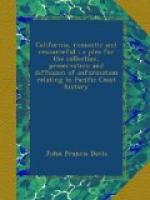In swift contrast to this idyllic scene, which is shared with us by few other sections of this country, stands the history of a period where for nearly two years this State was without authority of American civil law, and where, in practice, the only authority was such as sprang from the instinct of self-preservation. No more interesting phase of history in America can be presented than that which arose in California immediately after the discovery of gold, with reference to titles upon the public domain. James W. Marshall made the discovery of gold in the race of a small mill at Coloma, in the latter part of January, 1848. Thereupon took place an incident of history which demonstrated that Jason and his companions were not the only Argonauts who ever made a voyage to unknown shores in search of a golden fleece. The first news of the discovery almost depopulated the towns and ranches of California, and even affected the discipline of the small army of occupation. The first winter brought thousands of Oregonians, Mexicans and Chilenos. The extraordinary reports that reached the East were at first disbelieved, but when the private letters of army officers and men in authority were published, an indescribable gold fever took possession of the nation east of the Alleghanies. All the energetic and daring, all the physically sound of all ages, seemed bent on reaching the new El Dorado. “The old Gothic instinct of invasion seemed to survive and thrill in the fiber of our people,” and the camps and gulches and mines of California witnessed a social and political phenomenon unique in the history of the world — the spirit and romance of which have been immortalized in the pages of Bret Harte.
Before 1850 the population of California had risen from 15,000, as it was in 1847[2], to 100,000, and the average weekly increase for six weeks thereafter was 50,000. The novelty of this situation produced in many minds the most marvelous development. “Every glance westward was met by a new ray of intelligence; every drawn breath of western air brought inspiration; every step taken was over an unknown field; every experiment, every thought, every aspiration and act were original and individual.”




